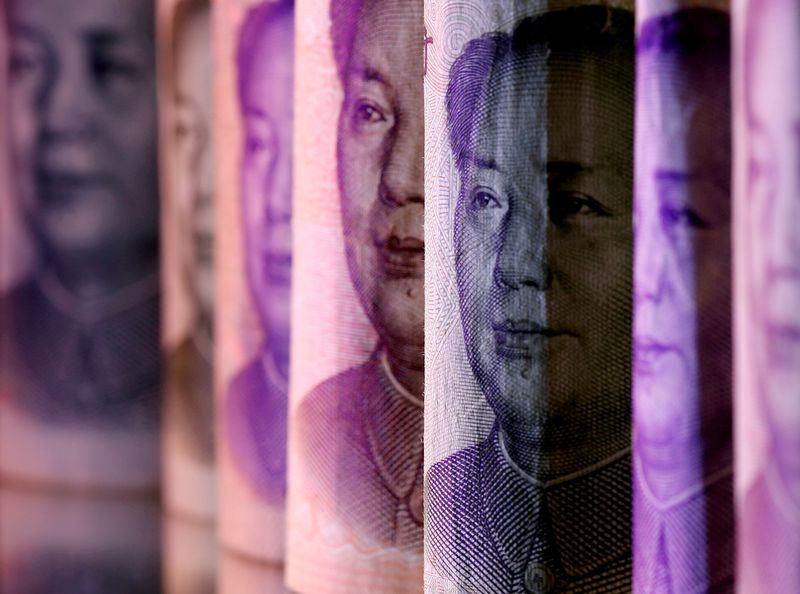SHANGHAI (Reuters) - China's yuan is facing renewed downward pressure, dragged lower by a surging U.S. dollar, a hawkish Federal Reserve and widening monetary policy divergence between the world's two largest economies.
The yuan has lost about 4% to the dollar since mid-August to weaken past the psychologically important 7 per dollar level. The local currency also looks set for the biggest annual loss since 1994, when China unified official and market exchange rates.
The rapid yuan declines prompted the People's Bank of China (PBOC) to lower the amount of foreign exchange financial institutions must hold as reserves to rein in weakness.
WHAT ELSE HAS PBOC DONE SO FAR TO SLOW THE YUAN'S DECLINE?
The PBOC has been setting firmer-than-expected daily yuan midpoint fixings since late August to prevent excess yuan weakness, as the onshore spot yuan can only trade in a 2% narrow range around the midpoint.
Market participants take any significant discrepancy between market projections of what the fix might be and where the PBOC actually sets it as an indication of which way the central bank wants to tug the market.
Senior officials from the central bank and FX regulator have also ramped up efforts warning the market of strong one-way bets against the local currency through verbal messages.
Wang Chunying, spokesperson of the State Administration of Foreign Exchange (SAFE), was quoted by the state broadcaster CCTV last week urging companies not to speculate on the currency.
WHAT OTHER OPTIONS DOES PBOC HAVE, OTHER THAN OUTRIGHT INTERVENTION?
** HIGHER TRADING COST
The PBOC could make it more expensive for financial institutions to short the yuan in derivatives markets, by raising their foreign exchange risk reserve ratio when purchasing dollars through forwards.
The central bank has adjusted the risk reserve requirements multiple times over the past few years before it scrapped it in October 2020, when the yuan rose sharply.
** TIGHTER OFFSHORE LIQUIDITY
The central bank could issue yuan-denominated bills in Hong Kong to withdraw yuan from the offshore market and raise the cost of betting against the Chinese unit.
"The Chinese authorities are leaving no doubt about their resolve to dampen depreciation pressure on the yuan," said Khoon Goh, head of Asia research at ANZ.
"If depreciation pressure remains, the PBOC could raise the reserve requirement for forwards to 20%, or increase yuan bill issuance in Hong Kong to make it more expensive to short the offshore yuan."
** COUNTER-CYCLICAL FACTOR IN YUAN'S DAILY GUIDANCE FIX
The PBOC first introduced the counter-cyclical factor to its daily midpoint fixing formula for the yuan-dollar exchange rate in 2017.
The regulators said the factor was an effort to better reflect market supply and demand, lessen possible "herd effects" in the market and help the market focus more on macroeconomic fundamentals. The central bank adjusted the methodology a few times before suspending it in October 2020.
"We do not expect an official restoration of the counter-cyclical adjustment factor in its daily fixing until the valuation of the CNY become much cheaper," Becky Liu, head of China macro strategy at Standard Chartered (OTC:SCBFF), said in an note published earlier this month.
Liu expects the PBOC to further lower the FX reserve requirement ratio by another 200 basis points.
The yuan has weakened nearly 10% against the dollar so far this year, but its value against major trading partners only fell about 0.7% year-to-date.
** HIGHER CROSS-BORDER INFLOWS

Regulators could adjust a parameter on cross-border corporate financing under its macroprudential assessments to limit domestic firms' ability to seek overseas funding.
"The yuan exchange rate level itself is not the most important, the nature of the issue is whether China's cross-border capital flows remain stable," said Zhong Zhengsheng, chief economist at Ping An Securities.